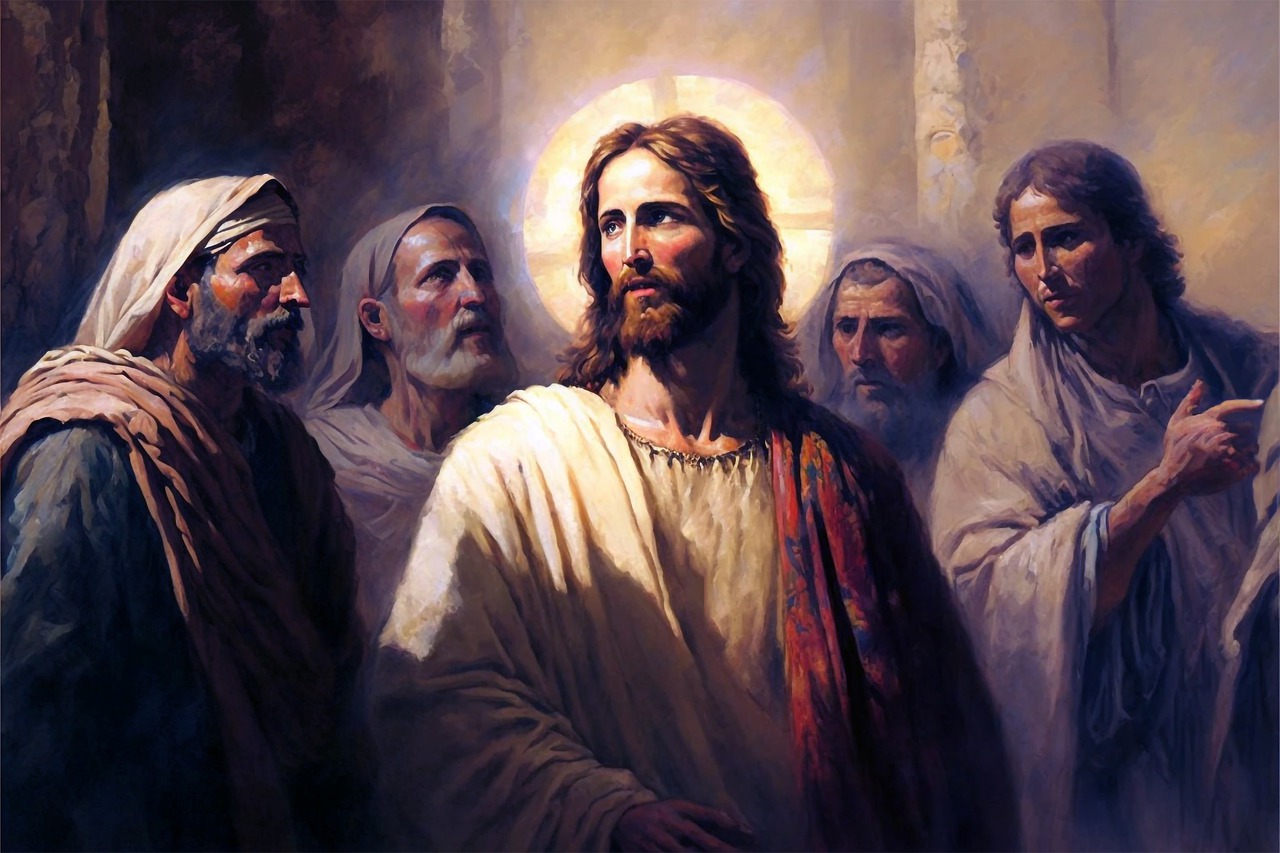From Mortality to Immortality: Hezekiahs Journey and Jesus Eternal Promise In Isaiah 38
Exploring the themes of mortality, spiritual healing, and the impact of prayer, this article delves into the story of Hezekiahs sickness and recovery in Isaiah 38, highlighting the significance of his prayer and Gods intervention, as well as its connection to Jesus eternal promise.

Photo by Juan Davila on Unsplash | Commercial use allowed
Theme of Mortality in Isaiah 38
Isaiah 38 presents a profound reflection on mortality, emphasizing the duty of the sick to prioritize spiritual concerns and prepare for the end of life. When Hezekiah was confronted with the reality of his illness, he exemplified sincerity and deep reflection, serving as an enduring model for individuals facing mortality. His response underscores the certainty of death for all individuals and the importance of facing mortality with a thoughtful and reflective mindset. The narrative provides a timeless lesson on the significance of acknowledging mortality and the need for spiritual readiness, resonating with readers across generations as they grapple with the universal experience of mortality and the enduring relevance of spiritual preparedness.
Hezekiah’s sincerity and preparation for death offer valuable insights into the universal human experience of mortality, underscoring the significance of setting one’s house in order and approaching the end of life with spiritual readiness. The narrative in Isaiah 38 prompts readers to consider the fragility of life and the importance of confronting mortality with honesty and introspection, fostering a deeper understanding of the human experience and the enduring significance of spiritual preparedness. This reflection on mortality serves as a poignant reminder of the temporal nature of human existence and the need for individuals to approach life with a sense of purpose and spiritual readiness in the face of mortality.
The duty of the sick, as depicted in Isaiah 38, serves as a poignant reminder of the human experience of illness and the imperative need for spiritual reflection and preparedness in the face of life’s inevitable end. Hezekiah’s sincere response and preparation for death offer timeless lessons on the significance of facing mortality with spiritual readiness and thoughtful reflection, underscoring the importance of acknowledging the certainty of mortality and the need for spiritual preparedness. The narrative prompts readers to contemplate the significance of personal and spiritual readiness in the face of mortality, encouraging individuals to reflect on their own lives and consider the importance of being prepared for the eventual end of life. This timeless reflection on mortality and spiritual preparedness provides a compelling framework for individuals to grapple with the existential realities of life and death, emphasizing the need for a thoughtful and reflective mindset when confronting the inevitability of mortality.
Theme of Mortality in Isaiah 38
Isaiah 38 offers a poignant portrayal of the theme of mortality, delving into the profound implications of human frailty and the inevitability of death. The narrative not only highlights Hezekiah’s personal encounter with mortality but also provides timeless insights into the universal human experience of confronting the finitude of life. Hezekiah’s sincere response to his illness serves as a compelling example of the duty of the sick to prioritize spiritual concerns and prepare for the inevitable end of life. This introspective exploration underscores the importance of approaching mortality with a thoughtful and reflective mindset, recognizing the profound significance of spiritual readiness in the face of human frailty and mortality.
#Isaiah38 #MortalityandHope #JesusEternalPromise #PrayerforHealing #DesireforLifeBeyondMortality #JesusTeachingsonEternalLife #HopeBeyondTemporalConstraints #GratitudeforLife #EternalLifePromise #HumanLonging #BeliefinJesus #AssuranceofLifeEternal
Furthermore, Hezekiah’s genuine preparation for death offers invaluable insights into the universal human longing for meaning and purpose in the midst of mortality. The narrative prompts readers to grapple with the existential realities of life and death, emphasizing the timeless relevance of acknowledging the certainty of mortality and the need for spiritual preparedness. By portraying Hezekiah’s sincere response to his illness, Isaiah 38 provides a compelling framework for individuals to contemplate the significance of mortality in their own lives, urging them to approach their own mortality with a sense of spiritual awareness and readiness. Ultimately, the narrative serves as a poignant reminder of the profound interconnectedness between mortal existence and the imperative need for spiritual reflection and preparedness in the face of life’s inevitable end.
The narrative in Isaiah 38 prompts readers to consider the fragility of life and the importance of confronting mortality with honesty and introspection, fostering a deeper understanding of the human experience and the enduring significance of spiritual preparedness. Hezekiah’s sincerity and preparation for death offer valuable insights into the universal human journey towards spiritual readiness and the enduring significance of acknowledging the certainty of mortality. The narrative serves as a poignant illustration of the universal human experience of confronting finitude and serves as a timeless reminder of the significance of preparing for the end with thoughtful consideration and spiritual reflection.
 Hezekiah’s Prayer and the Eternal Promise
Hezekiah’s Prayer and the Eternal Promise
Hezekiah’s prayer for extended life not only serves as a poignant example of the intimate connection between prayer, faith, and God’s response but also highlights the transformative power of personal supplication in the face of mortality. When Hezekiah fervently prayed for more time to live, it underscored the deep longing for life and the profound implications of divine grace, offering a compelling parallel to the eternal promise found in Jesus Christ. This connection between mortal existence and divine intervention is a recurring theme in the narrative of Hezekiah’s illness and recovery, emphasizing the enduring relevance of prayer and faith in the context of the eternal promises articulated in the Scriptures.
For instance, Hezekiah’s prayer not only demonstrates the human desire for life but also exemplifies the profound impact of faith and personal supplication on one’s life. It highlights the intricate interplay between mortal experiences and the transformative power of prayer, underscoring the enduring significance of seeking divine intervention in the face of illness and mortality. Furthermore, the parallels drawn between Hezekiah’s prayer and the eternal promise in Jesus Christ provide a compelling framework for understanding the profound connection between mortal frailty, spiritual restoration, and the enduring hope found in the redemptive promise of Christ.
In essence, Hezekiah’s prayer and its role in his extended life serve as a powerful testament to the intimate relationship between mortal existence, faith, and the enduring promise of divine grace, further illuminating the profound connection between personal supplication and the eternal redemption offered through Jesus Christ. The narrative in Isaiah 38 prompts readers to consider the transformative impact of faith and personal supplication on one’s life, encouraging individuals to approach their own mortality with a sense of spiritual awareness and readiness. In doing so, the narrative not only offers valuable insights into the human experience of confronting mortality but also serves as a poignant reminder of the enduring significance of acknowledging the certainty of mortality and the need for spiritual preparedness.
Fulfillment in Jesus Christ
Isaiah’s prophetic vision of the Messiah encompasses three distinct roles: the promised King, Servant, and Conqueror. These portraits find their consummation in the person of Jesus Christ, who embodies the attributes delineated in the prophetic passages of Isaiah 38. For instance, as the promised King, Jesus establishes an eternal reign that fulfills the lineage of David, as foretold in Isaiah’s prophecy. Furthermore, Jesus embodies the characteristics of the humble Servant, reconciling God’s holiness and mercy through his sacrificial mission, in accordance with Isaiah’s portrayal. Lastly, Jesus fulfills the role of the Anointed Conqueror, bringing salvation and deliverance, judging the wicked, and making all things new, aligning with Isaiah’s prophetic description.
The narrative of Hezekiah’s sickness and miraculous recovery serves as a prelude to the ultimate fulfillment of God’s promise in Jesus Christ. In this context, the profound connection between mortal experiences and the eternal reign of Christ is vividly illustrated. The themes of mortality, spiritual healing, and the impact of prayer, as depicted in the story of Hezekiah, serve as a poignant foreshadowing of the redemptive work that Jesus would accomplish. Therefore, Isaiah 38 not only provides historical insight into Hezekiah’s life but also symbolically points to the eternal promise and redemptive mission of Jesus Christ, underscoring the enduring relevance of the narrative in illuminating the transformative impact of Christ’s redemptive mission.
The fulfillment of Isaiah’s prophecies in Jesus Christ underscores the enduring relevance of the narrative in illuminating the eternal promise and the transformative impact of Christ’s redemptive mission. The narrative not only provides historical insight into Hezekiah’s life but also symbolically points to the eternal promise and redemptive mission of Jesus Christ, emphasizing the interconnectedness of mortal experiences and the enduring reign of Christ. In doing so, the narrative prompts readers to contemplate the enduring significance of Jesus Christ’s redemptive mission and its transformative impact on mortal existence. The themes of mortality, spiritual healing, and the impact of prayer, as depicted in the story of Hezekiah, serve as a poignant foreshadowing of the redemptive work that Jesus would accomplish, further illuminating the profound connection between mortal experiences and the enduring promises articulated in the Scriptures.
Preparation for the End
In Isaiah 38, Hezekiah’s illness prompted him to contemplate the certainty of his mortality, leading him to seek spiritual preparedness for the end of his life. This contemplation serves as a poignant reminder of the universal human experience of confronting the finitude of existence and the importance of acknowledging the inevitability of mortality.
The narrative underscores the importance of setting one’s house in order, not only in a literal sense but also in a spiritual and emotional context. Hezekiah’s actions reflect a deliberate effort to address unfinished matters and to ensure that his affairs were in order before his potential passing. This aspect of the narrative provides a compelling framework for understanding the broader implications of mortality and the human experience of preparing for the end. It prompts contemplation on the significance of personal and spiritual readiness in the face of mortality, encouraging individuals to reflect on their own lives and consider the importance of being prepared for the eventual end of life.
Hezekiah’s preparation for the end serves as a poignant illustration of the universal human journey toward spiritual readiness and the enduring significance of acknowledging the certainty of mortality. It prompts introspection and invites individuals to consider the importance of embracing spiritual readiness as a means of finding peace and fulfillment in the face of life’s inevitable conclusion. This narrative offers valuable insights into the human experience of confronting finitude and serves as a timeless reminder of the significance of preparing for the end with thoughtful consideration and spiritual reflection. The narrative in Isaiah 38 prompts readers to consider the fragility of life and the importance of confronting mortality with honesty and introspection, fostering a deeper understanding of the human experience and the enduring significance of spiritual preparedness.
 Connection with Biblical Teachings
Connection with Biblical Teachings
Isaiah 38’s portrayal of Hezekiah’s sickness and recovery holds a significant place within the broader tapestry of biblical teachings. It offers profound insights into the human experience of mortality and the enduring relevance of faith in the face of illness. One of the central themes of the Bible is the concept of mortality and the human experience of facing the transient nature of life. Isaiah 38 serves as a poignant reminder of the universal truth that all individuals encounter the reality of mortality, and in doing so, it underscores the importance of faith and spiritual preparedness in the face of life’s uncertainties and frailties.
Moreover, the narrative of Hezekiah’s illness and recovery resonates with the broader biblical themes of faith, divine intervention, and the transformative power of prayer. It underscores the interconnectedness of mortal experiences and the enduring truths of biblical teachings. The narrative serves as a testament to the timeless relevance of the Scriptures in addressing the fundamental aspects of human existence. Through its depiction of Hezekiah’s journey, Isaiah 38 illuminates the profound connection between mortal existence, spiritual faith, and the eternal promises articulated in the Scriptures. This connection underscores the enduring significance of the narrative in guiding individuals through the complexities of mortality and the unwavering hope found in faith and divine providence.
In essence, Isaiah 38 stands as a testament to the enduring relevance of biblical teachings in addressing the human experience of mortality and the transformative power of faith in the face of life’s challenges and uncertainties. It serves as a guiding light, offering timeless wisdom and insights into the profound connection between mortal existence and the enduring promises articulated in the Scriptures. The narrative prompts readers to contemplate the enduring significance of biblical teachings and their transformative impact on the human experience of mortality. The interconnectedness of mortal experiences and the enduring truths of biblical teachings offers a compelling framework for individuals to grapple with the existential realities of life and death, emphasizing the need for a thoughtful and reflective mindset when confronting the inevitability of mortality.
 Reflection on Spiritual Healing
Reflection on Spiritual Healing
The narrative of Hezekiah’s illness and recovery in Isaiah 38 offers a profound reflection on the universal need for spiritual healing and the transformative impact of seeking God’s mercy and grace in the midst of mortality. Hezekiah’s experience serves as a poignant reminder of the human longing for healing and spiritual restoration in the face of frailty and mortality. The narrative underscores the enduring relevance of addressing the deep-seated need for spiritual healing, resonating with individuals across diverse cultural and historical contexts.
Furthermore, the parallels between Hezekiah’s spiritual healing and the eternal promise in Jesus Christ provide a compelling framework for understanding the profound connection between mortal frailty, spiritual restoration, and the enduring hope found in the redemptive promise of Christ. Just as Hezekiah sought healing and restoration in the face of his illness, individuals today seek spiritual wholeness and redemption through the eternal promise embodied in the life and teachings of Jesus Christ. This linkage between Hezekiah’s experience and the redemptive promise of Christ offers a timeless reflection on the universal human quest for spiritual healing and the enduring hope found in divine grace and mercy.
The narrative of Hezekiah’s spiritual healing resonates with the human experience of longing for spiritual restoration and reflects the enduring significance of seeking God’s mercy and grace in the face of mortality. The parallels between Hezekiah’s journey and the eternal promise in Jesus Christ provide a profound reflection on the interconnectedness of mortal frailty, spiritual restoration, and the enduring hope found in the redemptive promise of Christ, offering timeless insights into the universal human longing for spiritual healing and redemption.
Significance of Hezekiah’s Song of Praise
Hezekiah’s song of praise for his recovery holds profound significance in the context of acknowledging divine intervention and healing amidst mortality. The song encapsulates Hezekiah’s deeply felt gratitude, serving as a poignant expression of his faith and trust in God’s mercy and grace during a time of illness and recovery. The heartfelt lyrics of the song underscore the transformative impact of gratitude, offering a timeless example of how acknowledging divine intervention can bring solace and hope in the midst of physical frailty and mortality.
The song not only reflects Hezekiah’s personal experience but also resonates with the broader human experience of illness and recovery. It serves as a poignant reminder of the enduring significance of expressing gratitude in the face of adversity, offering valuable insights into the transformative power of faith and thankfulness amidst life’s challenges. Moreover, the song of praise provides a compelling example of how spiritual reflection and gratitude can serve as sources of strength and resilience, illuminating the profound connection between acknowledging divine intervention and the human experience of mortality and healing. This timeless expression of gratitude continues to inspire individuals to reflect on the enduring significance of faith and thankfulness, offering a compelling example of the transformative impact of acknowledging divine mercy and grace during times of trial and recovery.
The Role of Faith in Healing
Hezekiah’s story in Isaiah 38 beautifully illustrates the profound role of faith in the process of healing and restoration. When Hezekiah was struck with a life-threatening illness, he turned to prayer and faith in the face of mortality. His sincere and fervent supplication to God not only serves as a testament to the transformative power of faith in times of distress but also exemplifies the enduring significance of unwavering belief in the context of illness and healing. Hezekiah’s unwavering faith becomes a beacon of hope, emphasizing the timeless truth that faith plays a pivotal role in navigating the challenges of mortality and illness, resonating with the broader biblical teachings on the transformative power of faith in the face of adversity and uncertainty.
In the context of Jesus’ eternal promise, Hezekiah’s unwavering faith serves as a poignant reminder of the enduring relevance of faith in the human experience. His steadfast belief in the face of illness and the miraculous healing that followed underscores the interconnectedness of faith and the eternal promise embodied in Jesus Christ. Through Hezekiah’s testimony, the narrative of faith, healing, and divine intervention becomes a profound reflection of the transformative impact of faith in the broader context of Jesus’ redemptive mission. This narrative not only highlights the enduring relevance of faith in the face of mortality but also provides a compelling framework for understanding the profound connection between faith, healing, and the eternal promises articulated in the Scriptures.
The narrative of faith, healing, and divine intervention in Hezekiah’s story provides a profound reflection on the transformative power of faith in the face of mortality and underscores the enduring significance of unwavering belief in navigating the challenges of illness and uncertainty. Hezekiah’s unwavering faith becomes a beacon of hope, emphasizing the timeless truth that faith plays a pivotal role in the human experience of confronting mortality and illness, resonating with the broader biblical teachings on the transformative power of faith in the face of adversity and uncertainty. In essence, the narrative not only offers valuable insights into the transformative impact of faith but also serves as a poignant reminder of the enduring relevance of faith in the context of Jesus’ eternal promise.
 Comparison with Other Biblical Accounts
Comparison with Other Biblical Accounts
When comparing Hezekiah’s sickness and recovery with other biblical accounts of healing and divine intervention, it becomes evident that the broader themes of hope, restoration, and the transformative impact of faith are recurring elements in the tapestry of biblical narratives. For example, the story of the woman with the issue of blood in the New Testament, found in Mark 5:25-34, shares similarities with Hezekiah’s experience. Both accounts emphasize the profound impact of faith and divine intervention in the face of illness. In the New Testament story, the woman’s unwavering faith in Jesus’ ability to heal her led to her miraculous restoration to health. Similarly, Hezekiah’s sincere prayer and faith in God’s mercy resulted in his remarkable recovery from a terminal illness. These parallel narratives underscore the enduring significance of faith and divine intervention in the context of mortal experiences, offering valuable insights into the transformative power of faith across different biblical accounts.
Moreover, the account of the healing of Naaman, a commander in the army of the king of Aram, as recorded in 2 Kings 5:1-19, provides another compelling parallel to Hezekiah’s story. Naaman’s journey to seek healing from the prophet Elisha and his subsequent miraculous cleansing from leprosy exemplify the transformative impact of faith and divine intervention in the context of physical restoration. Similarly, Hezekiah’s fervent prayer and God’s intervention in adding years to his life serve as a testament to the enduring significance of faith and divine healing in the face of mortality. These parallel accounts offer profound insights into the interconnectedness of mortal experiences, divine intervention, and the enduring promises articulated in the Scriptures, underscoring the timeless relevance of faith and hope in the context of healing and restoration.
The comparison with other biblical narratives not only enriches our understanding of Hezekiah’s experience but also highlights the universal themes of faith, divine intervention, and the transformative power of hope and restoration across different accounts in the Bible. These parallels serve as a testament to the enduring significance of faith and the profound impact of divine intervention in the context of mortal experiences, offering valuable insights into the interconnectedness of biblical narratives and the enduring promises of healing and restoration found in the Scriptures.
The comparison with other biblical accounts not only enriches our understanding of Hezekiah’s experience but also highlights the universal themes of faith, divine intervention, and the transformative power of hope and restoration across different accounts in the Bible. These parallels serve as a testament to the enduring significance of faith and the profound impact of divine intervention in the context of mortal experiences, offering valuable insights into the interconnectedness of biblical narratives and the enduring promises



